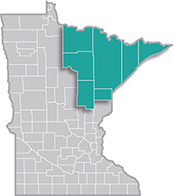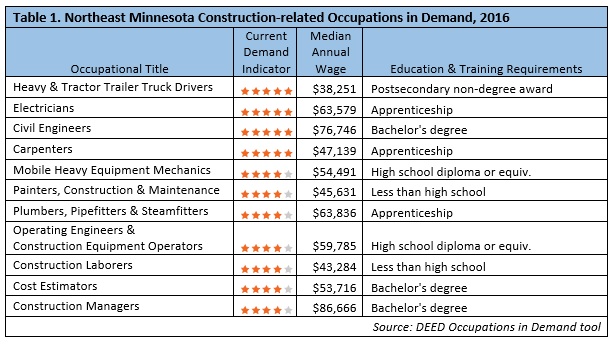 Home to the state's second-largest metro, the Northeast Region has a strong industrial sector, tied largely to the area's abundant natural resources.
Home to the state's second-largest metro, the Northeast Region has a strong industrial sector, tied largely to the area's abundant natural resources.
Most of the manufacturing base centers on mining and forest products industries. More than half of the sector's employment is in paper and machinery manufacturing.
Want the freshest data delivered by email? Subscribe to our regional newsletters.
3/16/2017 12:04:56 PM
Erik White
Though the name of the event was “Construct Tomorrow,” job seekers looking for a job today learned that they might want to focus on the construction industry in Northeast Minnesota. To generate interest, DEED participated along with representatives of building contractors and trade unions at the Construct Tomorrow event at the Duluth Entertainment Convention Center on March 7 and 8, 2017.
The goal was to show high school students, parents, and other job seekers the different types of careers and training available in the building trades. According to the Construct Tomorrow site, the event was led by construction trades trainers (skilled teachers that show people how to become electricians, plumbers, or carpenters) and contractors (businesses that manage construction projects).
Employers have created these events because they are looking for workers – “people who want to work hard every day and make great money and love what they do.” Recent events in Hinckley and Duluth are related to the construction industry taking on a higher profile in Northeast Minnesota after a surge of job openings during last summer’s construction season.
Due to current demand, several construction careers have risen to the top of the Occupations in Demand list in Northeast Minnesota:

In addition to high demand, these occupations also provide high wages. For example, Construction Managers and Civil Engineers both earned more than $75,000 at the median, while Electricians, Plumbers, and Construction Equipment Operators had median annual wages around $60,000 in the Arrowhead region.
While a couple of the occupations require a bachelor’s degree, most construction careers can be learned through on the job training. People wouldn’t even need a high school diploma to start working as Construction Laborers or Painters, as well as several other construction occupations that aren’t in as high of demand in the region, such as Tapers, Roofers, Tile and Marble Setters, Cement Masons and Concrete Finishers, Drywall and Ceiling Tile Installers, Septic Tank Servicers, and Pipelayers. Despite low educational requirements and relatively low demand, most of these jobs still offer high wages.
Likewise, there are several construction jobs that can be started with a high school diploma before transitioning into a career through an apprenticeship, such as Carpenters, Electricians, Plumbers, Stationary Engineers and Boiler Operators, Millwrights, Glaziers, Brickmasons and Blockmasons, and Structural Iron and Steel Workers.
People interested in hard-working, high-paying opportunities might be interested in exploring the construction field. There is a large amount of information available on these careers, and a growing number of employers engaged in getting the message out to students and job seekers in the region.
Contact Erik White at erik.white@state.mn.us or 218-302-8413.